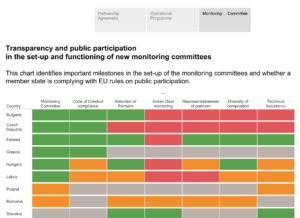The end of 2022 coincides with the conclusion of the preparation of the 2021-2027 cohesion policy. Soon, the European Commission will approve the last partnership agreements and operational programmes outlining the investment priorities and specific objectives for the following years. At the same time, there are other important processes to follow at the European and national levels.
Francesca Canali, EU policy officer | 16 December 2022

The revision of the national energy and climate plans (NECPs) is starting, the implementation of the recovery and resilience plans is ongoing and Member States are preparing a new list of investment proposals under the REPowerEU plan. The investment decisions that are made now will shape the direction of the EU’s energy transformation and will have a significant impact on the lives of European citizens. Member States must make the right choices and adopt policies that are in line with the objectives of the European Green Deal to achieve climate neutrality by 2050.
To ensure that the right decisions are made, proposals must be carefully scrutinised. This is where civil society organisations act as a bridge between EU policies and citizens, regions and cities by analysing and monitoring the preparation and implementation of plans and programmes. Although these organisations have vast expertise and knowledge that could be pivotal for efficient decision-making, their role is often reduced to a formality and they are not given enough space in important discussions. Unfortunately, their exclusion seems to be a growing trend in the EU’s participatory processes and crisis management is not a valid excuse. The preparation of the 2021-2027 cohesion policy is not an exemption.
In the EU’s regional policy, the role of civil society is defined by the partnership principle, which has been regulated by the European Code of Conduct on Partnership since 2014. The code of conduct provides guidance on the engagement of civil society organisations and sets a series of rules to strengthen cooperation between public authorities and partners, including rules on the selection of partners, public consultations and the appointment of monitoring committees. Officially, the code of conduct applies to all phases of the programming of cohesion policy funds for the current 2021-2027 period, starting with the preparation of the plans. Nevertheless, our recent analysis with Climate Action Network (CAN) Europe paints a different picture and reveals the misapplication of the partnership principle in 10 Member States.

_

_

_

_

_ According to our findings, most governments failed to conduct consultations with civil society during the preparation of partnership agreements and operational programmes. Overall, the quality of the consultations is judged negatively (or only partially positively) in most countries. In Estonia, for example, the national authorities did not organise any consultation processes with civil society on partnership agreements. In countries where consultations were held, the process was organised in a way that did not allow civil society to have a meaningful say or influence the direction of the programmes. This inevitably affected the quality of final investments.
According to our findings, most governments failed to conduct consultations with civil society during the preparation of partnership agreements and operational programmes. Overall, the quality of the consultations is judged negatively (or only partially positively) in most countries. In Estonia, for example, the national authorities did not organise any consultation processes with civil society on partnership agreements. In countries where consultations were held, the process was organised in a way that did not allow civil society to have a meaningful say or influence the direction of the programmes. This inevitably affected the quality of final investments.
The same reasoning applies to monitoring committees. Monitoring committees are currently being appointed and will play a central role in monitoring the implementation of the programmes once the European Commission approves them. Although committees have not yet been set up in all Member States, our analysis reveals three main challenges:
- There is too little space for environmental civil society organisations on monitoring committees. Considering the amount of funding devoted to climate objectives and the need to check whether programmes are in line with the EU’s climate policy and other EU Green Deal targets, it is not sufficient to have such a limited number of environmental organisations taking part in these committees;
- The selection of partners on monitoring committees is not inclusive and fails to achieve an acceptable level of diversity. Relevant groups that are very active in society, like youth organisations and LGBTQ+ activists, are left out of the conversation, as in most cases they are not recognised as relevant partners;
- Technical assistance for capacity building for stakeholders is often limited or difficult to receive. With the exception of Slovakia, in the remaining analysed countries, capacity building support provided by the managing authorities is not good enough to strengthen the institutional capacity of stakeholders. In Poland, for instance, some technical assistance is provided, but this is effectively limited to travel reimbursement for members of the monitoring committees.
Our conclusions are twofold. On the one hand, these examples illustrate that governments often fail to apply the partnership principle correctly, despite this being one of the cornerstones of the cohesion policy. On the other hand, our findings also reveal that some of the issues that civil society organisations face are caused by the limitations of the European Code of Conduct on Partnership in its current form. As the need to update the code of conduct is well known by the European Commission, the document is currently being revised. In order to continue guaranteeing the engagement of stakeholders in the budgeting process, this instrument needs to be strengthened and made compatible with the challenges we face today.
If the misapplication of the partnership principle casts a shadow on the 2021-2027 cohesion policy, the status of public participation and stakeholder engagement in other participatory processes is not promising either. Too often, decision-making takes place behind closed doors all across the EU. Last year, civil society organisations were sidelined from the preparation of the plans in most countries, with no mandatory consultation or monitoring committees and very little opportunity to influence investment proposals. Now, unless stronger provisions are imposed in the negotiations between institutions, the preparation of the REPowerEU chapters risks having very little engagement, just as the recovery process did. At the end of the trilogues on REPower this week, the European Parliament announced that the transparency and public participation of the process will be strengthened, still the specific provisions of the text remain unclear and unspecified. At a time when citizens are affected by overlapping crises, European and national institutions must commit to better public scrutiny. The public can and must play a crucial role to avoid greenwashing and achieve a more sustainable future for the EU.
Never miss an update
We expose the risks of international public finance and bring critical updates from the ground – straight to your inbox.
Institution: EU
Theme: public participation | RePowerEU
Location: EU
Project: After recovery towards cohesion
Tags: REPowerEU | public participation
